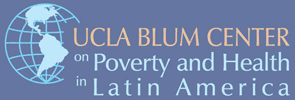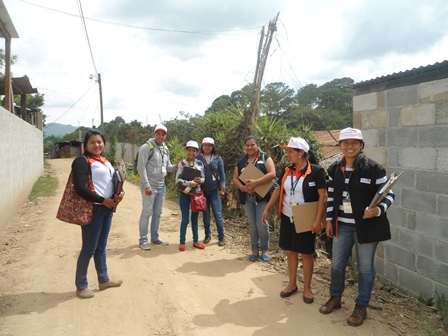Report from the field: 2015 UCLA Blum Center Summer Scholar Evelyn Sánchez
Report from the field: 2015 UCLA Blum Summer Scholar Evelyn Sánchez in Guatemal City, Guatemala
by Evelyn Sánchez, Master in Social Welfare Candidate
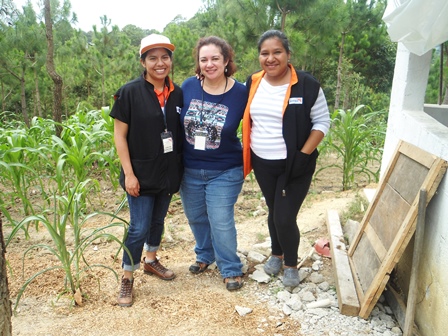 A)
A) 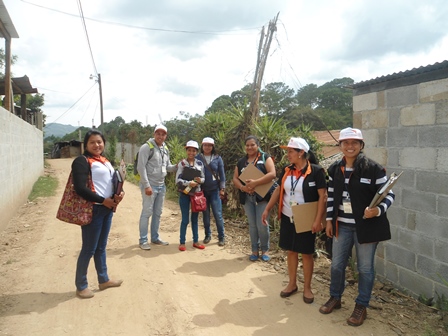 B)
B)
I have been working for seven weeks as a member of World Vision Guatemala, an NGO that focuses on child health and well-being. I have been living in Guatemala City, the country's capital, and enjoying the amazing luxury of being able to walk to work. Although Guatemala City consistently ranks as one of the most dangerous cities in the world, I have been fortunate in my excursions into the city on the always quick and crowded public transportation - the Transmetro - and the often maligned red buses. I am extremely fortunate to work with an amazing organization through the UCLA Blum Center Summer Scholars Program.
Today I arrived back to Guatemala City after my first week of fieldwork in the nearby municipality of San Raymundo. I spent one week living in a home with my seven team members in the outskirts of San Juan Sacatepequez, another nearby municipality. We collected data in the aldeas, villages of the municipality. I am also scheduled to be in the field for the next two weeks and I am beyond excited to jump into the field after spending the first half of my trip preparing for it.
Thankfully, one never stays at the desk for long at World Vision; I got to venture out of the city even in preparing for the fieldwork. I spent a week in Antigua, Guatemala training for the data collection and analysis, exploring the rocky streets and seeing a volcano slowly erupt over the course of two days. Fieldwork was scheduled to be in two municipalities: San Raymundo and Comapa. San Raymundo is a municipality just an hour and half away from the city but basically world apart due to its large indigenous population. The Comapa municipality in the Jutiapa Department in the eastern part of the country is known for the rocky terrain, dry heat and ever-present threat of chikungunya, a potentially deadly disease spread transmitted through mosquito bites. My supervisor and I traveled to both locations over the course of a week to prepare maps and train our survey team (three from each municipality) for the primary data collection to take place at the end of July and beginning of August.
World Vision Guatemala is part of the larger World Vision International organization. Its main goal is to improve the health, education, and economic development of families in high-needs areas. In Guatemala, it accomplishes this by working in low-income departments, which are equivalent to what a state would be in the U.S. The project I am working on is the mid-term evaluation of the Child Health Targets Impact Study (chTIS) being conducted jointly by World Vision International and The John Hopkins School of Public Health. We have two intervention sites and two control sites. Our control sites created a health committee of citizens to improve health services in the community, while the intervention sites have health committees, along with a home visiting program for pregnant women and children under the age of 2 and advocacy training for the community. My main duties are to prepare the data collection tools and train the enumerators for data collection. In particular, my team is interested in evaluating the home visiting program, which is a new model for Guatemalan citizens. The home visiting model is unique because it trains women from the community, not outsiders, to work as home visitors. Our home visitors are all volunteers and about half are illiterate but they've dedicated time to learning about pregnancy and new born health and committed to helping other women in the community.
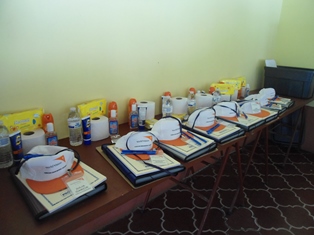 C)
C) 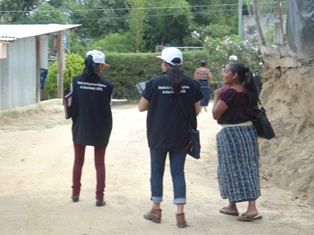 D)
D) 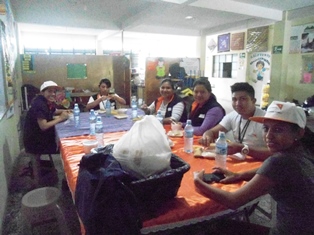 E)
E)
Fieldwork
I spent the first half of my trip preparing for fieldwork and data collection. My first lesson in the field is that no matter what, there's always something you haven't prepared for. We set up our operation base in a small house in the Arucarias section of San Raymundo that we rented for the week. As soon as we set up the supplies we'd been preparing for the past few weeks, we discovered everything we didn't prepare for. We had two boxes of staples but no stapler. We rented the house due to the quiet area it was in, but right next door there is an Evangelical Christian convention taking place; during the nights we would hear loud singing and fireworks. There was also a makeshift bar that popped up at night on the other side of our home so when we got home late from field work, tired, sweaty, and hungry, we were greeted by bolos, people who had imbibed a little too much.
Despite the little mishaps, being out in the field has been amazing. The house has three bedrooms with bunk beds that we share. We bond and discuss whose turn it is to kill the spiders that love coming in through unseen openings. In the morning we wake up and stagger our schedules so we can shower in the two stalls that have hot water. We eat breakfast together and then pack ourselves in a car. All eight of us somehow fit in a car meant for five passengers. We go out into the different villages and divide our tasks. In the morning we will survey people in the community and in the afternoons, we'll do focus groups. Once we get home in the evenings, we have to do the data entry for our surveys or work on the transcriptions for the focus groups.
This is the most exhilarating, never-ending work I have ever done. In these moments, our whole focus is the study. It helped that we did not have any internet connection at all and that our television did not work. Our team has grown close in the past week and I imagine that we will continue to do so even more over the next two weeks. Being home is a nice reprieve from fieldwork but I am beyond excited Comapa next week, a municipality known for its rocky terrain and intense dry heat.
I love what I am doing. I know that this is the first year that the UCLA Blum Center and World Vision have worked together and it is an amazing partnership. Our work focuses on the intersection of poverty and health in Guatemala's poorest communities and the need for policy to address these issues. Our first week of data collection has been fortuitous and we hope that if our results are great, we can encourage the development of other such programs to empower communities.
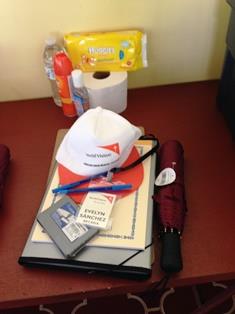 F)
F) 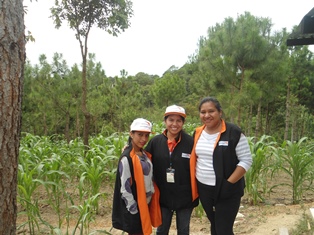 G)
G) 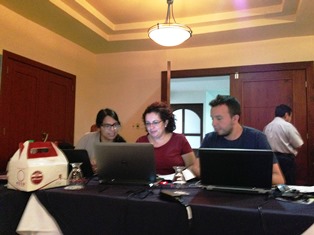 H)
H)
A) "With my supervisor Liza and teammate Yahaira in a madre-guia's home in Llano de la Virgen in San Raymundo"
B) "The survey team in Llano de la Virgen in San Raymundo"
C) "The team's items for fieldwork on our first day"
D) "Being guided by a mother guide to the homes of beneficiaries in the village of Pamoca in San Raymundo"
E) "Taking a break from fieldwork to eat lunch together at the World Vision office in San Raymundo"
F) "My fieldwork toolk-it in San Raymundo with the essentials"
G) "Taking a break in a madre-guia's home in aldea Llano de La Virgen in San Raymundo with my fellow teammates Julia and Yahaira"
H) "Analyzing and inputting data after a day of fieldwork"
